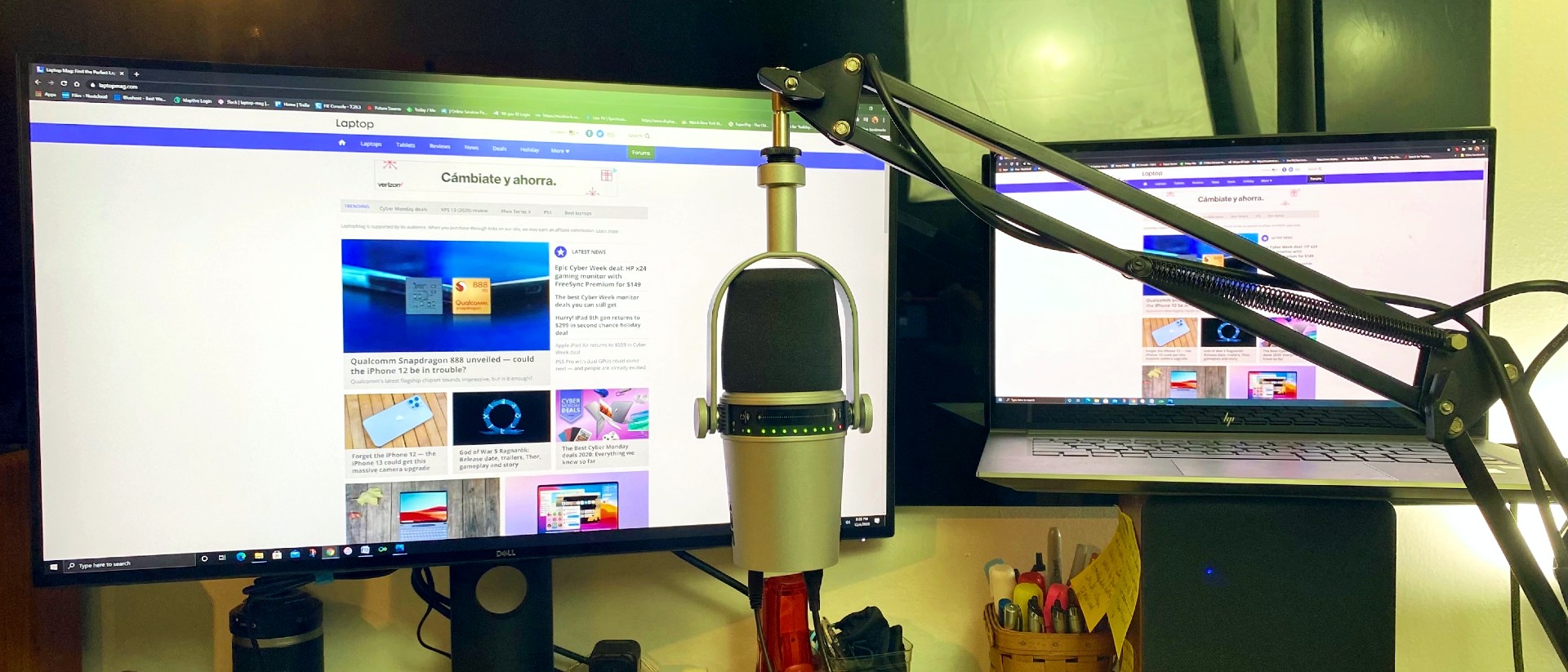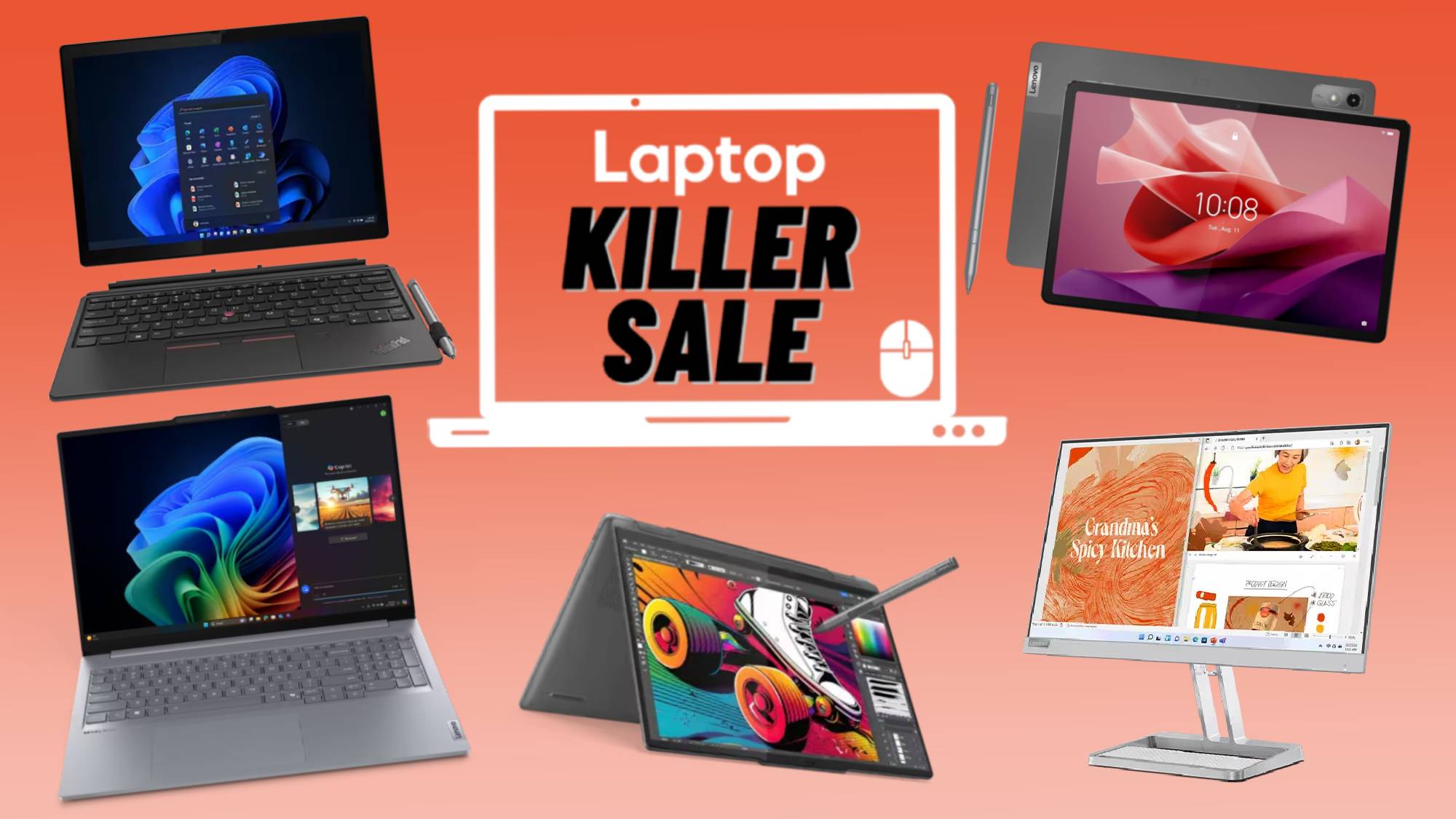Laptop Mag Verdict
The Shure MV7 is the professional studio USB mic your podcast or stream needs and that your talent deserves.
Pros
- +
Superb audio reproduction
- +
Clean design
- +
Easy setup
- +
Excellent software
- +
User Friendly
Cons
- -
Pricey
- -
Doesn’t come with a stand
Why you can trust Laptop Mag
As soon as you open the box and get a hold of the Silver Shure MV7, you know it means business. From its high-quality all-metal build to the professional studio look, it screams “you better bring your A-game.” Drink some hot tea with lemon and get your vocal cords ready, it’s business time.
Shure MV7 pricing and configurations
A bundle is available for $379.00 that includes the MV7 mic, a boom arm and a pair of SRH440-BK ($79.00) professional studio headphones. There’s a Tripod bundle ($279) and Desktop bundle ($259) available as well.
Shure MV7 design
The all-metal design of the Shure MV7 XLR/ USB mic is well constructed and felt solid in my hand as I mounted it to my microphone boom arm. It comes with a black foam windscreen to prevent plosives and gives it that “pro” feel. The Shure logo is located on both sides of the mic in black. Below the windscreen, on the front, the only plastic on the unit are the touch controls for gain, headphone volume, and mute. The front panel touch controls are recessed into the microphone and function very well by simply sliding your thumb back and forth to control headphone volume, mic gain, or mute. Included are a 10-foot XLR Cable, a 10-foot USB-A cable, A 10-foot USB-C cable, and a thread adapter.
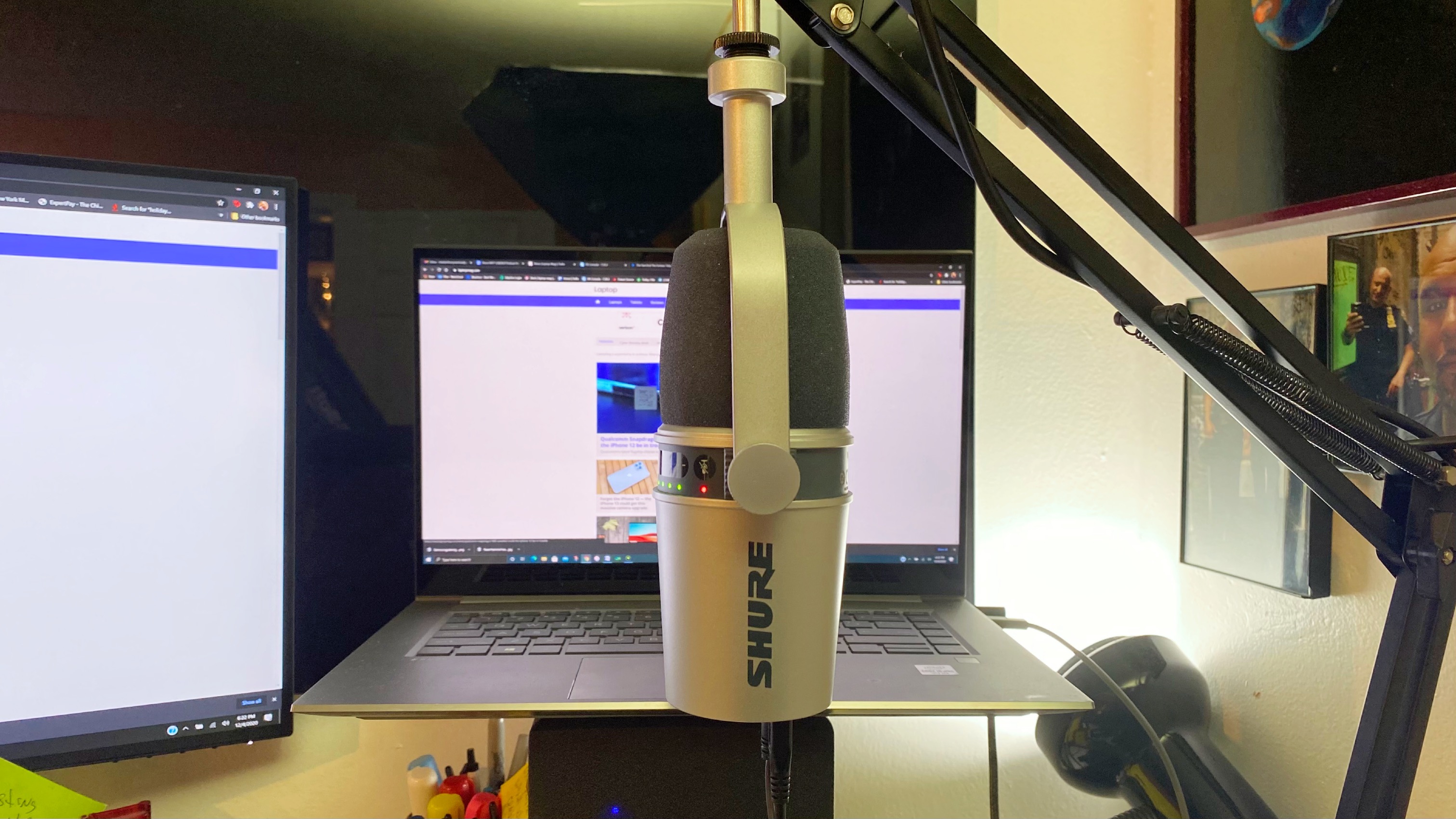
On the undercarriage of the Shure MV7, you will find an XLR input, a micro USB port, and a 3.5mm headphone monitor input. The option of using XLR or USB gives the MV7 a leg up since using more than one USB mic on a computer can get a bit tricky. With an XLR microphone, which connects to your computer via a separate mixer, you get a better quality recording, more control, multiple tracks and mics inputs that aren’t reliant on software or your computer’s components. USB mics are fantastic, affordable, and are a wonderful plug-and-play option for anyone entering the world of podcasting or streaming, but to go to that next level, a mixer that features XLR inputs, controls, sound effect options, is a wise investment.
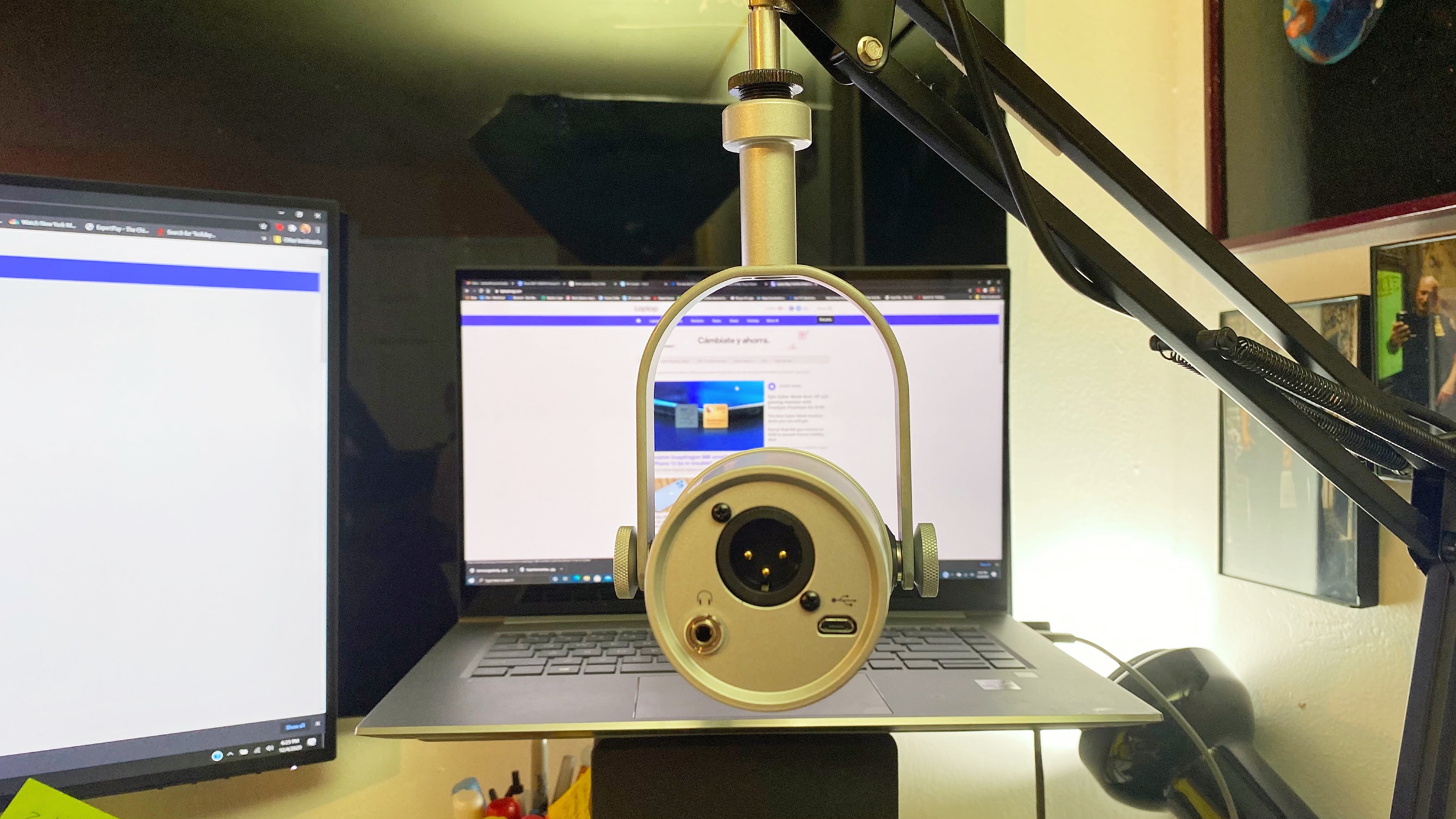
The Shure MV7 looks and feels like a professional studio microphone and measures 6.1 x 3.6 inches and weighs 1.2 pounds. It does not come with a stand of any kind, but several options are available at purchase, including a desktop, tripod, or boom arm. The Shure is lighter and smaller than the Hyper X Quadcast (8.5 x 2 inches, 1.58 pounds) but larger than the Razer Seiren Emote (3.9 x 7.6 x 3.9 inches). It’s closest in size (4.3 x 3.8 x 8.3 inches) and weight (1.4 pounds) to the Blue Yeti Nano. The lightweight yet sturdy build makes it a great mic to take with you if you’re recording on the go.
Shure MV7 microphone quality
Shure has a long history of excellence and experience, and it shows in the build quality of the MV7. There are no RGB lights as the MV7 is not built with a space-age aesthetic of any kind except the touch controls located on the front. It’s strictly built to record and reproduce high-quality studio-level audio and vocals and it achieves that intended goal brilliantly.
Once I got over the brief sadness of it not coming with a stand, I mounted it to my boom arm and got to work recording a podcast. The MV7 is a professional studio microphone. Do not confuse it with anything else -- just because it has a USB input, doesn’t mean a thing. This is no toy, and it will take your recording quality to the next level. It is plug-and-play, ready to go from the moment it’s out of the box, whether you download the Shure Plus Motiv software or not, and that’s a great thing. That said, please do download the software, you’re going to be happy you did.
The MGV7 uses Shure’s Voice Isolation Technology so it’s laser-focused on your vocals to give you a professional recording with minimal to no background or room noise. It works as advertised as I typed away on my keyboard while recording and the mic didn’t pick up any clicks or clacks. Also, thanks to Voice Isolation Technology, you get that soundproof studio recording quality.
Unlike most of the other USB microphones I have reviewed this past year, the MV7 doesn’t have multiple polar patterns, instead, it uses a unidirectional cardioid pattern. The MV7 is simply meant to record your voice, no more, no less. The MV7 is a Porsche, and you get exactly what you expect from it, high-end studio-quality audio reproduction and recording quality while sitting in your workspace or home without the soundproof studio.
The Shure MV7 is a USB dynamic microphone tailor-made for podcasting with its cardioid pattern reproducing stunning clear, crisp audio. During my testing, I never experienced any distortion no matter how loudly I yelled into it. While recording a podcast, the MV7 recorded my voice perfectly, catching every ounce of the depth and timbre in my tone. I whipped out my terrible El DeBarge falsetto to hurt my girlfriend’s ears and feelings. The MV7 accurately captured it and I can guarantee it will be used to torture her in the future.
The Shure MV7 is Apple MFi certified, which means you can connect the microphone to your iPhone, iPad, and iPod to record via a lightning cable that you can purchase for $25 on Shure’s website.
Software
The Shure Plus Motiv software is user friendly, easy to use, and makes finding the sound you’re looking for a breeze. The Motiv software leaves nothing to chance, allowing the user intimate control via manual mode or select auto mode to set it and forget it, which lets the intuitive software find the right balance of settings and control things.
In manual mode, you can get more hands-on with features, gaining the ability to pick which one of the customizable sound signatures. You can choose from either “dark, “natural” or “bright” within the software and find the sexy deep radio voice you’ve always dreamed of using.
You also have the option to choose “near” or “far” modes which allow you to either be the up-close podcaster or the excitable, constantly moving streamer you wish to be. I found that the far mode was excellent while streaming and being physically active behind the microphone. The far mode also does a great job when recording multiple voices during an interview when you only have one mic and two subjects. Near mode records vocals to perfection while podcasting and with the included Motive software you will get the sound quality you seek.
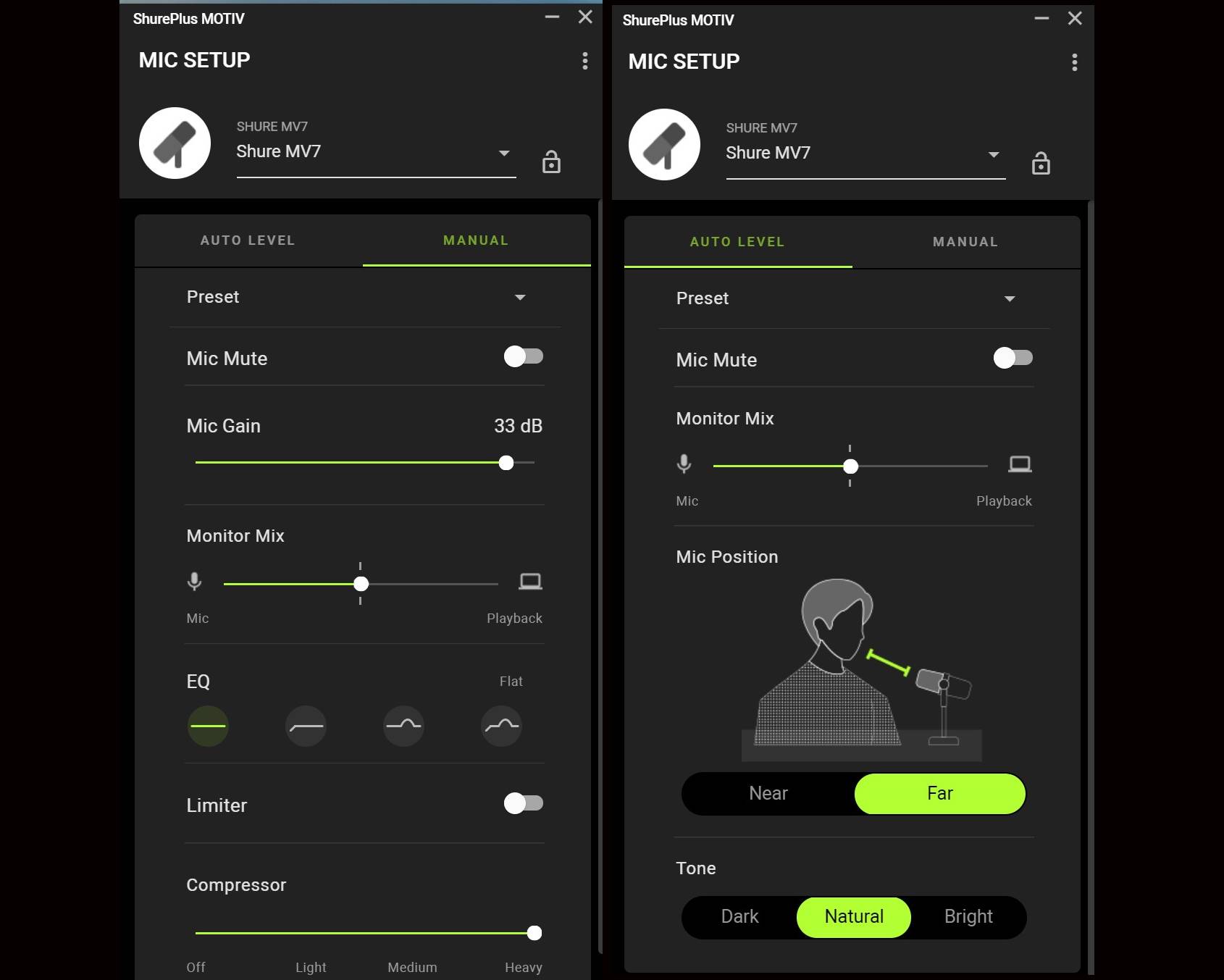
In the software, you can control mic gain, headphone monitor volume, or even mute the unit entirely. There are also four EQ profiles you can choose from including Flat, High Pass, Presence Boost, and a combination of High Pass and Presence boost. You can also control the sensitivity levels of the microphones compressor. The Shure Plus Motive software is cleanly laid out and is one of my favorite software suites to date.
You can also download the Shure Plus Motiv Video software, which is meant to work in tandem with your iPhone and Android device so that you can record videos using your phone’s camera and audio using the MV7.
Bottom Line
The Shure MV7 is worth every penny of its $249 price tag. From its sturdy all-metal construction to its professional studio quality audio recording that focuses on your voice thanks to its Voice Isolation Technology, it is without a doubt the best microphone I have reviewed to date. The simplicity of the Shure Plus Motiv software makes the overall experience even better, getting the most out of the microphone and out of your voice. There is something to be said for simplicity, and the user interface is a joy to use.
However, the MV7 loses some points for not coming with a stand. Sure its Yoke is super sturdy, engineered wonderfully, and mounts easily to a boom arm or stand you purchase separately. But for $249, any stand would be nice and should be included. At the end of the day, you will love this microphone; it will take your podcasting and streaming into the professional stratosphere and it’s worth the investment.

Mark has spent 20 years headlining comedy shows around the country and made appearances on ABC, MTV, Comedy Central, Howard Stern, Food Network, and Sirius XM Radio. He has written about every topic imaginable, from dating, family, politics, social issues, and tech. He wrote his first tech articles for the now-defunct Dads On Tech 10 years ago, and his passion for combining humor and tech has grown under the tutelage of the Laptop Mag team. His penchant for tearing things down and rebuilding them did not make Mark popular at home, however, when he got his hands on the legendary Commodore 64, his passion for all things tech deepened. These days, when he is not filming, editing footage, tinkering with cameras and laptops, or on stage, he can be found at his desk snacking, writing about everything tech, new jokes, or scripts he dreams of filming.
